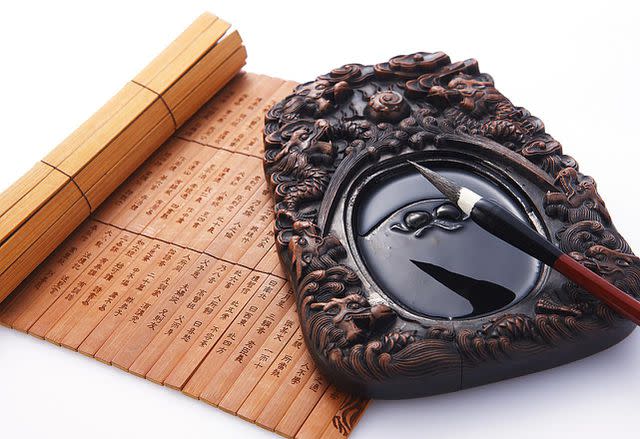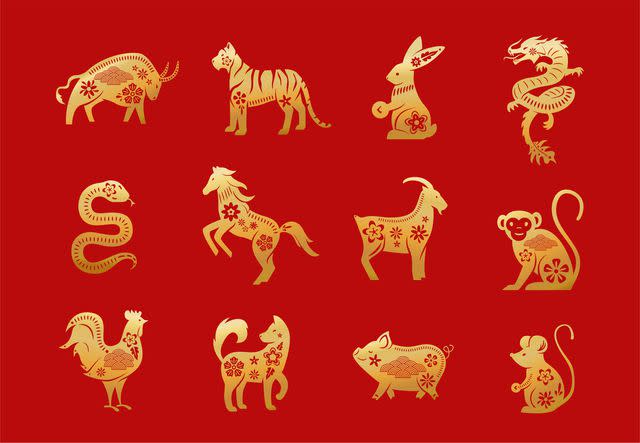What Your Chinese Zodiac Sign and Feng Shui Birth Elements Are
Elements and Zodiac Animals By Date & What They Mean
The traditional Chinese healing arts include feng shui, which looks at the physical environment, and Chinese astrology, which looks at the movement of heavenly bodies with your birthday and time. Find your Chinese zodiac sign and the related element to determine how this ancient Chinese practice relates to you in the table and charts below.

What Is Chinese Astrology?
The study of Chinese astrology is called the Four Pillars, also known as BaZi. Many feng shui practitioners study and apply Four Pillars analysis to inform their feng shui adjustments because these modalities are interconnected.
The Four Pillars are made up of the 12 zodiac animals (also known as the Twelve Earthly Branches) with the five elements (also known as the Ten Heavenly Stems). Together they create the Cycle of Sixty, which covers all the possible combinations of the 12 zodiac animals and the five elements. In Asia, this system reveals your fate or destiny, shows you times in your life when you may have more or less support, and indicates your strengths and weaknesses.
Astrology forecasts, like the weather, may show a high likelihood of a storm, but sometimes, it will be a sunny day. Feng shui is used with astrology to support your natural energy. However, it can’t change it.
The Four Pillars consist of one pillar that relates to your year, another your month, your day, and finally, the hour of your birth. An animal and element are associated with your pillars that follow the Cycle of Sixty. Four Pillars practitioners place the most emphasis on your day pillar or your Daymaster.
Most people refer to the year pillar when discussing Chinese zodiac signs. Each post has an association, the year pillar being the broadest and most general. Typically, the use of the Chinese zodiac animals and their elements by the year of birth is an exploration of personality archetypes and compatibility.
Here’s our list of each of the 12 Chinese zodiac signs, so you can find out which zodiac animal corresponds to your birth year.

tatianazaets / Getty Images
How to Find Your Chinese Zodiac Animal
The Chinese zodiac calendar is based on the year that you're born. The Chinese calendar starts on or around February 4 (depending on the year), so if you were born between January 1 and February 2, you would consider yourself the previous year.
For example: If you were born January 20, 1978, you would use the year prior, 1977.
If you were born on February 3, 4, or 5, you would need to consult a Chinese almanac for the exact transition time based on your birthday and time.
Animal | Years | Compatibility | Attributes |
Rat 子 | 2020, 2008, 1996, 1984, 1972, 1960, 1948, 1936, 1924 | Dragon, Monkey, Rat, and Ox | Intelligent and opportunistic |
Ox 丑 | 2021, 2009, 1997, 1985, 1973, 1961, 1949, 1937, 1925 | Rooster, Snake, and Rat | Hard-working and dependable |
Tiger 寅 | 2022, 2010, 1998, 1986, 1974, 1962, 1950, 1938, 1926 | Horse, Dog, and Pig | Optimistic and passionate |
Rabbit 卯 | 2023, 2011, 1999, 1987, 1975, 1963, 1951, 1939, 1927 | Pig, Ram, and Dog | Sensitive and kind |
Dragon 辰 | 2024, 2012, 2000, 1988, 1976, 1964, 1952, 1940, 1928 | Rat, Monkey, and Rooster | Powerful and demanding |
Snake 巳 | 2013, 2001, 1989, 1977, 1965, 1953, 1941, 1929 | Rooster, Ox, and Monkey | Transformational and intriguing |
Horse 午 | 2014, 2002, 1990, 1978, 1966, 1954, 1942, 1930 | Tiger, Dog, and Ram | Quick and active |
Ram 未 | 2015, 2003, 1991, 1979, 1967, 1955, 1943, 1931 | Rabbit, Pig, and Horse | Good-natured and romantic |
Monkey 申 | 2016, 2004, 1992, 1980, 1968, 1956, 1944, 1932 | Rat, Dragon, and Snake | Playful and clever |
Rooster 酉 | 2017, 2005, 1993, 1981, 1969, 1957, 1945, 1933 | Ox, Snake, and Dragon | Confident and talkative |
Dog 戌 | 2018, 2006, 1994, 1982, 1970, 1958, 1946, 1934 | Tiger, Horse, and Rabbit | Loyal and honest |
Pig 亥 | 2019, 2007, 1995, 1983, 1971, 1959, 1947, 1935 | Ram, Rabbit, and Tiger | Social and diplomatic |
How to Find the Element of Your Year of Birth
To find your Chinese zodiac element, it's determined by your birth year, particularly the last digit.
Metal: Birth years ending in 0 or 1
Water: Birth years ending in 2 or 3
Wood: Birth years ending in 4 or 5
Fire: Birth years ending in 6 or 7
Earth: Birth years ending in 8 or 9
What Are the Lucky Five Elements of the Chinese Zodiac?
In Chinese astrology, there are five elements: metal, water, wood, fire, and earth. Each element has its own features and associations with a different aspect of nature, and it's connected to your birthday (particularly, your birth year). People that belong to certain element types are believed to have distinct personality traits. Each element has its strengths and weaknesses.
Metal
A person born under the metal sign might seem rigid, strong, much like metal, and often, will serve as a leader. They like rules and order. The person may seem distant or aloof, but actually, the person is calculating their next steps, considering and weighing options. When in balance, a metal person is stable, organized, and can have a strong will, but can be patient and effect change. Metal is associated with the autumn season.
Water
A water person is fluid and sensitive to change but can be very imaginative and intuitive. They are powerful, well-spoken when ready to talk, and peaceful when they want to be. They can be torrential or calm and nurturing when the situation calls for it. Water is associated with winter.
Wood
The wood element is associated with springtime. Like the renewal in the season, the wood element looks for new ways to grow, improve, and expand. Wood is strong but also flexible and can be warm and generous. Wood is an achiever and likes to make plans and decisions.
Fire
Fire is associated with summer. Fire people are said to have vibrant, energetic personalities, often with fiery tempers. A person born under the fire sign is said to be adventurous and competitive, possessing strong self-esteem and leadership qualities. They are dedicated people, intensely passionate about their family and friends, and sometimes, they can be too eager or impulsive.
Earth
The earth sign is the middle of the zodiac, the balance between yin and yang. They are abundant, nurturing, harmonious, and stable. Instead of representing a season, it is the change of seasons, particularly the harvest. An earth person is patient, reliable, and likable but not as spontaneous since they are idealistic and purposeful. Although, sometimes to a fault—acting set in their ways.
How to Use the Cycle of the Elements
Using the five elements, you can begin exploring the element connected to your birth year and see how you can strengthen it with feng shui.
Like the earthly seasons, each element is interconnected through a cycle of creation (nourishment) and destruction (control). An example of the destructive or "control cycle" is water puts out fire, fire melts metal, metal cuts wood, wood separates the earth, and earth absorbs water.
Here, take a closer look at the nourishment cycle and feng shui tips on how to boost your element.
Earth element nourishes metal (earth holds metal): Bring in yellow, brown, and other earthy colors and grounding crystals, like fancy jasper.
Metal element nourishes water (metal carries water): Whites, grays, and metallic colors support you, as does the sound of metal chimes.
Water element nourishes wood (water feeds the wood): Dark blues, charcoal, and black colors or water fountains support you.
Wood element nourishes fire (wood starts a fire): Living green plants, as well as the colors green, blue, and teal, are suggested.
Fire element nourishes earth (Fire creates earth). Try out some fiery reds and oranges, triangles, and candles.
Read the original article on The Spruce.

